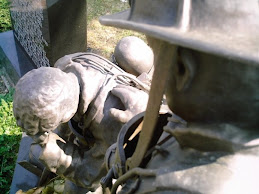I wrote this letter in response to this column in today’s New York Times. Thanks to OEditors Paul Hsieh and Amit Ghate for their edits that improved my letter. Here's hoping it gets published!
To the Editor:
(Re: “The Right and the Climate,” by Ross Douthat, July 25, 2010)
Overpopulation and worldwide famine weren't the only 1970's-era doomsday predictions that never came true. Environmentalists also falsely predicted catastrophic man-made “global cooling.” The so-called consensus among them then was that industrial man was driving the planet toward another cataclysmic Ice Age.
However, as that cooling cycle naturally gave way to a warming one, the greens switched the alarm to “global warming.” Now, as that cycle has started to trend back toward a cooling earth, they’ve again cooked up yet another scenario, this time the ambiguous, all-purpose “climate change.”
Those who are merely skeptical of the environmentalists’ doomsday scenarios should call their methodology for what it truly is: pseudo-science.
Joseph Kellard
Thursday, July 29, 2010
Tuesday, July 27, 2010
Communism's Nuremberg Trials?
By Joseph Kellard
Finally, after 1.7 million Cambodians were slaughtered under Khmer Rouge more than 30 years ago, some members of that communist regime are being brought to justice. Communism has never had its Nuremberg Trials – instead some communists went on to become major political players in new governments after their regimes collapsed. Putin is the poster boy.
Perhaps these Cambodian tribunals we lead to others like them, but I doubt it – and that’s primarily because people still hold to the faith that communism was noble in theory (that is, that sacrifice to the group, especially the wealthy to the poor, is good) but failed in practice (but only because those who practiced it didn’t do it right).
In a small way, this New York Time’s article only exacerbates all these evasions. You’d never know from this article or the nearly eight-minute video that accompanies it that Khmer Rouge was communist — the word is nowhere to be found or heard.
* This post was edited from its original.
Finally, after 1.7 million Cambodians were slaughtered under Khmer Rouge more than 30 years ago, some members of that communist regime are being brought to justice. Communism has never had its Nuremberg Trials – instead some communists went on to become major political players in new governments after their regimes collapsed. Putin is the poster boy.
Perhaps these Cambodian tribunals we lead to others like them, but I doubt it – and that’s primarily because people still hold to the faith that communism was noble in theory (that is, that sacrifice to the group, especially the wealthy to the poor, is good) but failed in practice (but only because those who practiced it didn’t do it right).
In a small way, this New York Time’s article only exacerbates all these evasions. You’d never know from this article or the nearly eight-minute video that accompanies it that Khmer Rouge was communist — the word is nowhere to be found or heard.
* This post was edited from its original.
Monday, July 19, 2010
And Now The Payoff
By Joseph Kellard
I got a check in the mail today. It came just a few days after I got my hands on the summer issue of The Objective Standard, a quarterly publication for an intellectually curious general audience that analyzes political and cultural issues from Ayn Rand’s philosophy of Objectivism. The check was for a book review I wrote that was printed in that same issue.
My review of John Eisenberg’s “That First Season,” a book about Vince Lombardi’s rookie year coaching the Green Bay Packers, was my first publication in an established, respected outlet — one that I know has high standards. On top of this, later this year, my letter to another football great, Dan Marino, will be printed in a high school textbook published by Pearson Education. I expect a check for this notch on my resume sometime in November.
While it’s certainly gratifying getting money for my work, what’s most important in these two instances is that my writing will reach a wider audience. Why is this important? Well, it means my ideas are reaching and potentially influencing more people. And outside of the absolute selfish joy I get from writing alone, this is the most important goal of my writing. It means I’m introducing more people to the ideas that I think are true, have shaped my life for the better and hopefully more of the world that I live in.
I’m immensely grateful, mainly to myself and those who have recognized my value, that my countless hours, days and years of writing have paid off enough to allow me to make my living at what I love to do. I’ve earned my keep as a journalist now for the past decade, and I’ve greatly enjoyed this line of work. But while I’ve come across and written stories about people that have helped to convey my sense of life and broader philosophy through these subjects, since in some of their qualities they have reflected both, more often journalism is far from the best vehicle to promote your worldview.
If I had my way, I would make my living as an Objectivist commentator, writing my opinions, and thus conveying my idea, on many important issues of the day. I’d also like to go on to write a few non-fiction books. Until then, I’ll stick with journalism to keep earning my keep, while on the side I will continue to write in other mediums as a way to promote my worldview, whether through essays in Objectivist publications, opinion pieces in non-Objectivists newspapers and website, and books.
I recently completed a 6,000 word essay on the fundamental ideas of Christianity and Catholicism, and how I believe these have played a fundamental role in the Catholic Church’s ongoing sex scandals. Again, what’s most important is the great pleasure and satisfaction I get from writing such a thought-provoking piece, and those emotions will turn to joy if my essay is published and thus read more widely than it otherwise would be on this blog or similar, limited outlets. I believe that wider, general audience desperately needs to know my ideas on this issue, and I expect that my ideas would then have an impact in shaping my world for the better, even if only on a small scale. Ultimately, it would mean a better world for me and the people I value to live in. And, who knows, this issue may become the subject of one of the books I would like to write one day, thereby gaining a potentially larger audience and impact. Lord knows the world needs such a book.
For now, though, I want the momentum of my publishing success to continue. So even as I prepare for a new journalism job that’s taking up a lot of time and effort, I’m making the time and finding the effort to work on revising a poem about romantic love and sex that I believe has the potential for print in a reputable poetry publication. And this foray into poetry just might lead me back to writing short stories, a genre that, in part, is where my writing began as a teenager.
Here’s the bottom line: I set out at a young age to become a professional and published writer, and those goals have become, slowly but surely, a reality.
I got a check in the mail today. It came just a few days after I got my hands on the summer issue of The Objective Standard, a quarterly publication for an intellectually curious general audience that analyzes political and cultural issues from Ayn Rand’s philosophy of Objectivism. The check was for a book review I wrote that was printed in that same issue.
My review of John Eisenberg’s “That First Season,” a book about Vince Lombardi’s rookie year coaching the Green Bay Packers, was my first publication in an established, respected outlet — one that I know has high standards. On top of this, later this year, my letter to another football great, Dan Marino, will be printed in a high school textbook published by Pearson Education. I expect a check for this notch on my resume sometime in November.
While it’s certainly gratifying getting money for my work, what’s most important in these two instances is that my writing will reach a wider audience. Why is this important? Well, it means my ideas are reaching and potentially influencing more people. And outside of the absolute selfish joy I get from writing alone, this is the most important goal of my writing. It means I’m introducing more people to the ideas that I think are true, have shaped my life for the better and hopefully more of the world that I live in.
I’m immensely grateful, mainly to myself and those who have recognized my value, that my countless hours, days and years of writing have paid off enough to allow me to make my living at what I love to do. I’ve earned my keep as a journalist now for the past decade, and I’ve greatly enjoyed this line of work. But while I’ve come across and written stories about people that have helped to convey my sense of life and broader philosophy through these subjects, since in some of their qualities they have reflected both, more often journalism is far from the best vehicle to promote your worldview.
If I had my way, I would make my living as an Objectivist commentator, writing my opinions, and thus conveying my idea, on many important issues of the day. I’d also like to go on to write a few non-fiction books. Until then, I’ll stick with journalism to keep earning my keep, while on the side I will continue to write in other mediums as a way to promote my worldview, whether through essays in Objectivist publications, opinion pieces in non-Objectivists newspapers and website, and books.
I recently completed a 6,000 word essay on the fundamental ideas of Christianity and Catholicism, and how I believe these have played a fundamental role in the Catholic Church’s ongoing sex scandals. Again, what’s most important is the great pleasure and satisfaction I get from writing such a thought-provoking piece, and those emotions will turn to joy if my essay is published and thus read more widely than it otherwise would be on this blog or similar, limited outlets. I believe that wider, general audience desperately needs to know my ideas on this issue, and I expect that my ideas would then have an impact in shaping my world for the better, even if only on a small scale. Ultimately, it would mean a better world for me and the people I value to live in. And, who knows, this issue may become the subject of one of the books I would like to write one day, thereby gaining a potentially larger audience and impact. Lord knows the world needs such a book.
For now, though, I want the momentum of my publishing success to continue. So even as I prepare for a new journalism job that’s taking up a lot of time and effort, I’m making the time and finding the effort to work on revising a poem about romantic love and sex that I believe has the potential for print in a reputable poetry publication. And this foray into poetry just might lead me back to writing short stories, a genre that, in part, is where my writing began as a teenager.
Here’s the bottom line: I set out at a young age to become a professional and published writer, and those goals have become, slowly but surely, a reality.
Tuesday, July 13, 2010
The Boss Is Dead: Long Live the Yankees!
By Joseph Kellard
“Breathing is first, winning is second,” New York Yankees owner George Steinbrenner once said.
That comment captures the essence of Steinbrenner, who died of a heart attack today at 80. If you want to know why the Yankees have become the most successful sports franchise in the world, it is that worship of winning, above all else, that explains it. It is what I and many others will and should remember most about the legendary and controversial owner.
“George never accepted second best,” said Mike Francesa, a sports radio host in New York. “And he always made it very clear he was going to demand performance. And when you have ownership that demands performance, you win. When you have ownership that’s complacent, you lose.”
That is the bottom line in professional sports, although many Yankees and Steinbrenner critics say that their success is due to another bottom line, the one that makes the Bombers the team that spend the most money on payroll each year. But Steinbrenner became the greatest owner in sports, not because of his bank account, but because of his will and efforts to win.
“He never stopped trying,” Steinbrenner once said his tombstone should read.
I became a Yankee fan when I was a young boy, a few years after Steinbrenner bought the team for $8 million in 1973. Within the span of a few years, he made the once proud and highly-successful franchise relevant again. New York won the American League pennant in 1976, followed by two World Series titles in 1977 and 1978.
Steinbrenner developed a reputation as a volatile owner, one who would stooped to sometimes petty, nasty behavior toward his players and managers. He fired and hired Billy Martin five times, and overall he changed managers more than 20 times. During the 1980s, his team went into a doldrums, and Steinbrenner was known as a meddling owner, which kept managers and players from wanting to wear the pinstripes. The lowest point came in 1990, when Steinbrenner was banned from baseball after he had paid a gambler to dig up controversial information about one of his players, Dave Winfield, in an effort to smear the slugger.
Nicknamed “The Boss,” Steinbrenner evolved into a larger-than-life figure whose fame went beyond sports, a persona that would come to be parodied on the hit comedy sitcom “Seinfeld.”
After his return to baseball in 1993, Steinbrenner mellowed, at least enough to take a more hands-off approach and allow his baseball personnel to make their own, independent decisions. The newer, more patient Steinbrenner was a reflection of another side to the man, one who is described as enormously caring and generous by players and others who knew him best. The result was four more World Series championships from 1996 to 2000.
While the Yankees had already been the most successful franchise in sports long before Steinbrenner bought the team, with 20 championship banners waving in their famed stadium, he took the team to a new level of success in the modern era. Steinbrenner is capitalist who made the Yankees into a worldwide brand with an estimated worth today of $3 billion. The YES Network that he created in 2002 has played a large part in that success, and today the team draws 4 million fans to Yankees Stadium.
“Later on, he understood the new economics of baseball better than anybody else,” said Franseca, whose radio show is aired on Yes, “and he’s made it work with the network, with the branding of the team, with every move he’s made.”
The critics relish any opportunity to say that the Yankees’ success is due to all the money they spend. The Yankees did just that in 2009 and won another World Series. But they also spent the most money of any team for eight years prior but never won a championship. True, they made it to the playoffs all but one year, including two World Series, and there is no doubt that spending the most money puts a team in the position to win. But there are other significant factors involved that make up a championship team, one of which includes having the right players come together to play as a winning team, superstars or not. But, above all else, the will to win has to undergird it all. This is what the Yankees, through good times and bad, have always had under Steinbrenner.
“George was not in it for the money,” Franseca said. “I know that sounds crazy … George was in this because he loved the game, he loved the competitiveness, and he loved the brand and he wanted to win, first and foremost he wanted to win.”
Other baseball owners are as wealthy as or wealthier than Steinbrenner, but he knew that in order to get results and to make even more money, you must spend and invest money – and to do so wisely. And along with that came Steinbrenner’s famous will to win.
In remembering The Boss today, Derek Jeter, who has won five World Series with the Yankees since he started playing shortstop for the team in 1996, said: “Everyone knows how tough he was … But you understood where it came from. He wanted to win, and he expected perfection.”
“Breathing is first, winning is second,” New York Yankees owner George Steinbrenner once said.
That comment captures the essence of Steinbrenner, who died of a heart attack today at 80. If you want to know why the Yankees have become the most successful sports franchise in the world, it is that worship of winning, above all else, that explains it. It is what I and many others will and should remember most about the legendary and controversial owner.
“George never accepted second best,” said Mike Francesa, a sports radio host in New York. “And he always made it very clear he was going to demand performance. And when you have ownership that demands performance, you win. When you have ownership that’s complacent, you lose.”
That is the bottom line in professional sports, although many Yankees and Steinbrenner critics say that their success is due to another bottom line, the one that makes the Bombers the team that spend the most money on payroll each year. But Steinbrenner became the greatest owner in sports, not because of his bank account, but because of his will and efforts to win.
“He never stopped trying,” Steinbrenner once said his tombstone should read.
I became a Yankee fan when I was a young boy, a few years after Steinbrenner bought the team for $8 million in 1973. Within the span of a few years, he made the once proud and highly-successful franchise relevant again. New York won the American League pennant in 1976, followed by two World Series titles in 1977 and 1978.
Steinbrenner developed a reputation as a volatile owner, one who would stooped to sometimes petty, nasty behavior toward his players and managers. He fired and hired Billy Martin five times, and overall he changed managers more than 20 times. During the 1980s, his team went into a doldrums, and Steinbrenner was known as a meddling owner, which kept managers and players from wanting to wear the pinstripes. The lowest point came in 1990, when Steinbrenner was banned from baseball after he had paid a gambler to dig up controversial information about one of his players, Dave Winfield, in an effort to smear the slugger.
Nicknamed “The Boss,” Steinbrenner evolved into a larger-than-life figure whose fame went beyond sports, a persona that would come to be parodied on the hit comedy sitcom “Seinfeld.”
After his return to baseball in 1993, Steinbrenner mellowed, at least enough to take a more hands-off approach and allow his baseball personnel to make their own, independent decisions. The newer, more patient Steinbrenner was a reflection of another side to the man, one who is described as enormously caring and generous by players and others who knew him best. The result was four more World Series championships from 1996 to 2000.
While the Yankees had already been the most successful franchise in sports long before Steinbrenner bought the team, with 20 championship banners waving in their famed stadium, he took the team to a new level of success in the modern era. Steinbrenner is capitalist who made the Yankees into a worldwide brand with an estimated worth today of $3 billion. The YES Network that he created in 2002 has played a large part in that success, and today the team draws 4 million fans to Yankees Stadium.
“Later on, he understood the new economics of baseball better than anybody else,” said Franseca, whose radio show is aired on Yes, “and he’s made it work with the network, with the branding of the team, with every move he’s made.”
The critics relish any opportunity to say that the Yankees’ success is due to all the money they spend. The Yankees did just that in 2009 and won another World Series. But they also spent the most money of any team for eight years prior but never won a championship. True, they made it to the playoffs all but one year, including two World Series, and there is no doubt that spending the most money puts a team in the position to win. But there are other significant factors involved that make up a championship team, one of which includes having the right players come together to play as a winning team, superstars or not. But, above all else, the will to win has to undergird it all. This is what the Yankees, through good times and bad, have always had under Steinbrenner.
“George was not in it for the money,” Franseca said. “I know that sounds crazy … George was in this because he loved the game, he loved the competitiveness, and he loved the brand and he wanted to win, first and foremost he wanted to win.”
Other baseball owners are as wealthy as or wealthier than Steinbrenner, but he knew that in order to get results and to make even more money, you must spend and invest money – and to do so wisely. And along with that came Steinbrenner’s famous will to win.
In remembering The Boss today, Derek Jeter, who has won five World Series with the Yankees since he started playing shortstop for the team in 1996, said: “Everyone knows how tough he was … But you understood where it came from. He wanted to win, and he expected perfection.”
Monday, July 12, 2010
Letter on Spending
This is an email I dashed off and sent this morning to a columnist at the New York Observer, for his column “Show Us the Money,” in the July 12, 2010 issue.
To Joe Conason:
Government spending as a means to economic recovery is horrible, rights-violating economics.
The myth that Franklin Roosevelt’s spending during the Great Depression lifted this nation out of that economic catastrophe is well documented in books such as “New Deal or Raw Deal” by Burton Fulsom Jr. Moreover, Obama’s so-called “stimulus” plan has done nothing of substance, and the canard that it saved this nation from sinking into a depression evades the fact that all that money must be paid for one day -- which will further depress the economy and prevent it from growing as it otherwise would under a free, capitalist economy.
That some poll finds a substantial majority of people favor more spending than less just means that most favor bureaucrats and politicians violating their individual rights to their property. Far from being as inevitable as death, taxation is theft and thus a massive violation of every individual’s right to keep his own money and spend it as he sees fit.
Politicians and their constituents who claim some need or some “right” to something -- such as medical care, housing, education -- have no right to these values on anyone’s dime. Those who produce, both rich and poor, have a moral and thus a political right to keep what they have earned, what is in fact theirs, and no ohter individual has any moral claim on it. One individual’s need is not a claim on any other individual’s life and property.
Those who want the government to loot other people’s earnings to spend it on their alleged “rights” to housing, medical care, education and other values had better look to voluntary charity to fulfill their needs, or, better yet, their own productive abilities, if they so chose to employ them.
Joseph Kellard
East Meadow NY
To Joe Conason:
Government spending as a means to economic recovery is horrible, rights-violating economics.
The myth that Franklin Roosevelt’s spending during the Great Depression lifted this nation out of that economic catastrophe is well documented in books such as “New Deal or Raw Deal” by Burton Fulsom Jr. Moreover, Obama’s so-called “stimulus” plan has done nothing of substance, and the canard that it saved this nation from sinking into a depression evades the fact that all that money must be paid for one day -- which will further depress the economy and prevent it from growing as it otherwise would under a free, capitalist economy.
That some poll finds a substantial majority of people favor more spending than less just means that most favor bureaucrats and politicians violating their individual rights to their property. Far from being as inevitable as death, taxation is theft and thus a massive violation of every individual’s right to keep his own money and spend it as he sees fit.
Politicians and their constituents who claim some need or some “right” to something -- such as medical care, housing, education -- have no right to these values on anyone’s dime. Those who produce, both rich and poor, have a moral and thus a political right to keep what they have earned, what is in fact theirs, and no ohter individual has any moral claim on it. One individual’s need is not a claim on any other individual’s life and property.
Those who want the government to loot other people’s earnings to spend it on their alleged “rights” to housing, medical care, education and other values had better look to voluntary charity to fulfill their needs, or, better yet, their own productive abilities, if they so chose to employ them.
Joseph Kellard
East Meadow NY
Sunday, July 11, 2010
Four New Books I'm Reading
I mistakenly posted my latest blog post "Four New Books I'm Reading" to my journalism blog. Go read it at: http://bit.ly/cA2lIb
Subscribe to:
Comments (Atom)































+-+June+2009.jpg)










